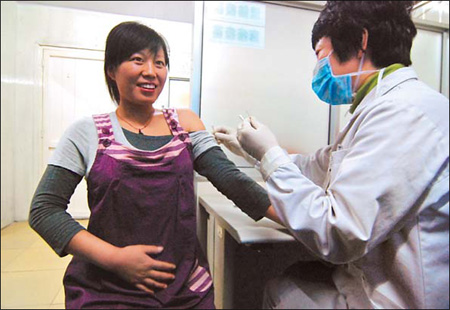Miscarriages, A/H1N1 shots 'not linked'
Several pregnant women had miscarriages after receiving the A/H1N1 flu vaccine on the Chinese mainland but the cases were not linked to the shots themselves, China's vaccine chief said yesterday.
 |
|
A pregnant woman receives the A/H1N1 vaccine in Qingdao, East China's Shandong province, on Dec 30, 2009. |
Liang Xiaofeng, director of the Chinese Center for Disease Control and Prevention's (CDC) immunization center, did not give further details on the exact number of miscarriages detected among about 10,000 would-be mothers who chose to receive the shot so far.
"The A/H1N1 flu vaccine has been proven worldwide to be safe and effective among pregnant women. Recommendations to take the shot for them (pregnant women), who are at particularly high risk of developing life-threatening complications once contracting the virus, remain unchanged," he told China Daily.
Most of the victims reported are women who were three months pregnant or less, Liang said.
About 15 percent of recognized pregnancies will end in a miscarriage, studies have found. More than 80 percent of miscarriages occur within the first three months of pregnancy.
"The miscarriages detected were all coincidental. In other words, without receiving the vaccine, it may still happen," Liang said.
However, by weighing the benefits and risks, pregnant women, who make up nearly 14 percent of the total number of reported deaths from the A/H1N1 flu on the mainland, should get the shot as long as the pandemic is still ongoing, he said.
A large majority of pregnant women are reportedly skeptical of the vaccine, particularly when the pandemic continues to be at low levels as it has been in past weeks.
 0
0 






